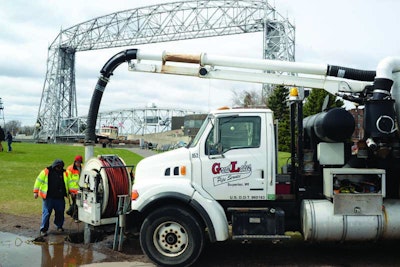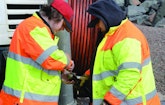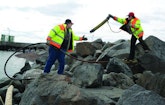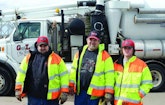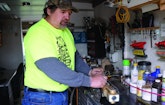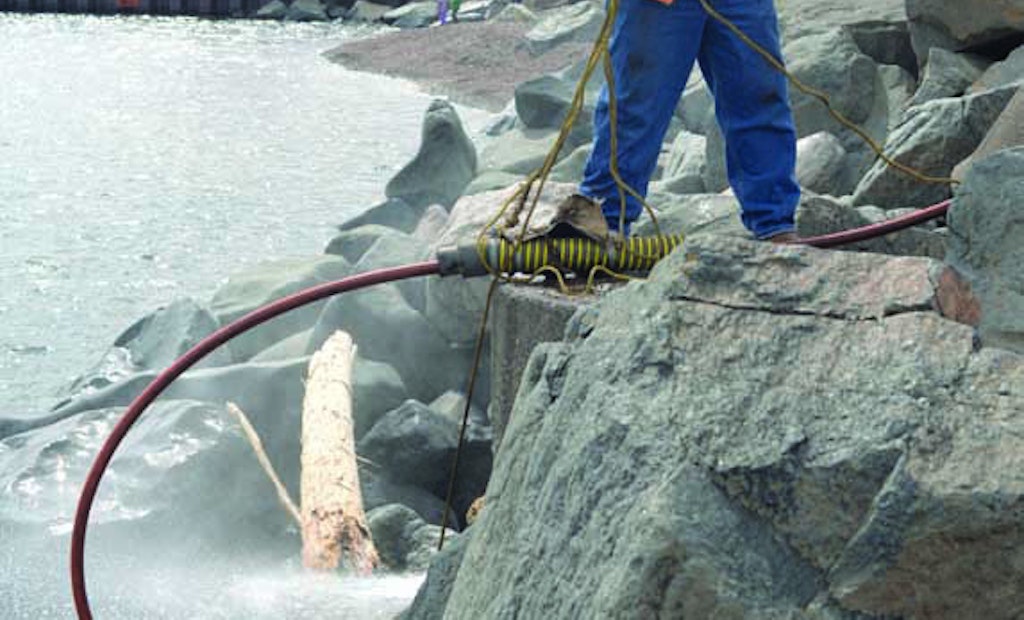
Interested in Municipal/Industrial?
Get Municipal/Industrial articles, news and videos right in your inbox! Sign up now.
Municipal/Industrial + Get AlertsAfter 20 years working for the City of Superior, Wisconsin, Dave Sigfrids was faced with an important decision about his future, and as it turned out, the future of two of his sons.
Sigfrids worked his way up through the city’s wastewater department, starting as a catch basin cleaner and eventually earning a position as foreman, running numerous crews. He hoped his service and experience would one day lead to a management position, but when the opportunity arose, he was passed over for someone with a college degree. Sigfrids was tasked with training the new person, which didn’t sit well with him, so he handed in his resignation.
He was on his own after two decades with the city and needed work. He knew the sewer business, so he picked up a 1979 Vactor 810, secured some business with local municipalities and started Great Lakes Pipe Service.
“I was making enough money to move forward and start a building process,” he says. “That was in 1999. I was cleaning and televising sewer systems. I had an Electric Eel machine and a small push camera from UEMSI. I was concentrating on municipal work and commercial. Residential was not on the agenda. I figured I could not do all and offer the performance I wanted
to give.”
Sigfrids knew he needed a newer Vactor truck, but that was a big expenditure that would take awhile to secure. Over time, he brought on a few employees, made solid contacts and began to grow. He could see the way forward, particularly when his son, Dave Jr., joined the firm in 2006. Six years later, another son, Dylan, came on board.
Great Lakes remains focused on sewer cleaning and inspection, services he and his sons know well. The company also handles lift station maintenance and repair, coordinating with another contractor that repairs and installs lift station pumps. Once the contractor lifts the pumps out, Sigfrids does the cleaning, and then everything can be reinstalled and returned to service.
Getting established
Sigfrids has built his company around a culture of service and commitment. The customer base is 90 percent municipal and 10 percent commercial, and he’s established good relationships with his clients.
“We are pretty close knit. We’re friends, and that is important,” Sigfrids says. “We get calls from clients and it’s helpful that we know their systems. We have their maps. Someone can call from one of these cities or towns and give us an address where there is a problem, and we can check the map and know exactly where the backup is.
“We are dealing with some clay sewer systems that are 100 years old. People don’t always understand that even though the ground is frozen, trees grow just as far down as they grow up. These trees sense the water inside the pipes. Being clay tile, they are not completely sealed and those roots grow right inside the pipes. This is a major issue, particularly with those old clay pipes.
“Basically what we do is clean it, televise it, give them the data and offer suggestions as to how to get it fixed, and we give some recommendations as to companies they can go to for the repair. … We have clients who have lines going under major thoroughfares, but they do not have the money or financing to do rehab or dig the pipe up. These are the customers who come to us annually to run the root cutter through and keep the system running.”
The bottom line, Sigfrids says, is they have to maintain the old sewer systems. “Some people do not understand that the sewer system is basically a mechanical device, and every mechanical device will fail eventually. Everything has a life expectancy, and certainly that is so with a sewer system. Over the years, they simply deteriorate, because water is abrasive, and then we have the roots. The system ages and falls apart.
“People will comment, ‘I’ve lived here 60 years and never had a problem.’ I ask, does your car last 60 years? It wears out.”
Great Lakes Pipe Service has preventive maintenance contracts with some municipalities, where they will inspect and clean a portion of the sewer system on an annual rotation. Sigfrids says it is all about maintaining and taking care of these old systems.
“Once they start finding failed pipe, they are dealing with I&I problems,” he says. “There is a lot of that going on. Every time there is a rain event, the pipes leak and every gallon of water that goes through the sewage plant costs money to be treated. We see a lot of that. But the main purpose is maintenance.”
He points out that sewer rodding and root cutting with high-pressure water are essential to the program. And they have an array of high-tech tools, including rotating nozzles, saw blades and chain flails — all to cut out roots. He says it’s important to spend the money on these nozzles because they are a critical part of the business.
Sigfrids is also frequently called on by other full service providers who are too busy to handle jobs in the Great Lakes’ immediate area.
“They sometimes are just unable to come all this way and they’ll ask if we can run a camera for them, so we end up subcontracting. They know they can depend on us, and we in turn call on them for some services we do not provide. That would include lining and pipe bursting. All underground repairs. They are also people we can go to for advice in some instances.”
When the call comes for inspection services, he and his crew turn to one of two units: a 2008 UEMSI pan and tilt camera system in a 1990 GMC panel van, or a UEMSI Predator Advantage mini mainline-inspection system for 6- to 36-inch lines. The latter is set up in a Haulmark single-axle trailer that can be pulled with their four-by-four recreational vehicle to reach remote locations inaccessible with a
full-size truck.
Big equipment includes a 2002 Vactor 2110 jet/vac truck and a smaller 1992 Guzzler unit.
The company’s stable of equipment also includes an older trailer jetter (2,000 psi/35 gpm) and a 1999 Landa steamer mini-jet (3,000 psi/15 gpm) with 300 feet of 5/8-inch hose. For nozzles, Sigfrids turns to Enz, KEG
and NozzTeq.
Great Lakes serves some commercial customers such as shopping malls and food processors, with whom they generally have maintenance agreements in place. The company also inspects new sewer systems that must be certified before the municipalities will take control.
“In all of these areas we are involved with, I have trained my sons to be thorough. Not to be in a hurry — to always do it right,” Sigfrids says. All three are PACP certified through NASSCO.
Keeping it personal
Sigfrids recalls those earlier days in business for himself and the immediate realization that he couldn’t just check out on the clock, because it was a 24/7 responsibility.
“Initially I had business cards made up, knocked on many doors. I explained my position and what I had been doing for years, and asked people to give me a chance. I gave demonstrations with my equipment — how I worked and how the equipment worked.
Great Lakes Pipe Services now operates out of a 1,600-square-foot facility with a small office and room to keep the equipment indoors during winter.
“I have been experimenting with an RV antifreeze and leaving equipment outside. This works with the Guzzler, but the Vactor needs to be stored in the heated shop.”
When temperatures drop well below zero during stretches of winter, they focus on equipment maintenance. His trailer rodder runs on water, and since his building never goes below 50 degrees, the equipment is always ready. He can go on a job site and unclog a sewer, turn around and drive right back to the barn and everyone is happy. Later during warmer weather, he’ll go back to clean and inspect for problems.
With a small crew, good scheduling is important. There is always someone at the main office, usually Sigfrids himself, while his sons are out on the road.
There can be several small communities on a single route, so they’ll take the big truck and move from one to the next. The operator can opt to stay in a motel or return to home base, depending on where they are.
“We remain a small, personal company,” he says. “People can pick up the phone and get me or my sons, particularly if there is an emergency. They know whom they are talking to. That’s important to me. They are friends. I trust them and they trust me. If there is a question about an invoice, they can get an answer right away. We can take care of it.”
